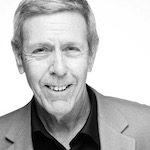The day before I turned 40, a Sunday toward the end of the merry month, we went for a drive from our home in West Hartford to the town of Litchfield, Connecticut. I was at the wheel, my wife navigating, our children, a thirteen-year-old boy and a nine-year-old girl, on the back seat of a dark red minivan. I had a lot on my mind, my job was exceedingly demanding, my father, gravely ill, but it was a glorious afternoon for an unhurried Memorial Day weekend trip to that scenic part of the state. We had no particular agenda, thought we’d just pass the time, see the green hills, pastureland, dairy cows. Maybe stop for an early supper. We went north, then west, listened to classic rock and roll, talked a little, everyone facing forward. Parked in front of a restaurant in town.
On the sidewalk, my heart started pounding, my chest tightened, I trembled, perspired, thought I would die then and there. My wife hustled the children back into the car, helped me into the front passenger seat, drove to a hospital. The boy asked if he and his sister had done something wrong. A blood gas test showed no evidence of a myocardial infarction. The doctor kept me overnight just to be safe, discharged me in the morning, said it must have been a panic attack. And happy birthday.
About a week later, I met with a psychiatrist. We talked, got together again the following week, talked some more: my actuality, briefly, then my history at greater length, childhood, young adulthood, family, career, how I got to this place, how I felt about my parents, work, life. I found the language of feeling as impenetrable as the jargon of wine-tasting.
“You said you had to console your mother when your father belittled you. How does it make you feel to remember that?”
“Emotional.”
“Yes, but can you be a little more precise?”

It was an arduous education, talk therapy, conducted with a series of psychiatrists and clinical psychologists as my career took me from one city to another. I learned to distinguish among sadness, fear, and anger, recognize that beneath my unfailingly placid bearing and polite behavior I was ripping mad, understand that my involuntary suicidal ideation, as they called it, was a sign of misdirected rage, born of my aversion to confrontation and one with my pattern of flight from uncomfortable situations. No plans, no practical steps toward taking my life, just fugitive images seen sideways, in the corners of my eyes, my right hand raising a gun to my temple, so fast I couldn’t say “there it goes again,” only “there it went.” Always a handgun, even before I owned one, never pills and plastic bags, ropes, razors, rooftops, rivers, railways, late-night wrecks on country roads, all the other means people choose every day to escape for once and for all. Kindly, capably, my therapists guided me in bringing lost memories to the surface, naming my feelings, making sense of my history, not just what happened to me but what part I played, how I sabotaged myself, why my own words, actions, performative utterances haunted me.
Neurotics, Freud said, suffer from reminiscences, and in this, at least, he was right, we need not accept his whole enterprise to admit it, need not, for instance, buy into the myth of fraternal parricide, see desire in every disturbance, reduce faith to projection and art to sublimation, invoke an unconscious death drive when the pleasure principle falls short. Neurotics suffer from reminiscences: simple enough. And psychiatrists and psychologists are not merely compassionate listeners but also dispassionate witnesses who will not validate untruths or settle for half-truths, want to hear clients rediscover the reality of the past, even the distant past, in view of the future. Want to hear a true word that breaks a new path.
Yet, my mother was a psychiatric social worker. She earned a master’s degree in social science at Case Western Reserve, worked briefly at Creedmoor when we lived in Queens, spent many years at Catholic Family Services in Hartford, undoubtedly helped a lot of people. At the wedding of a colleague’s daughter, an older woman introduced herself, said my mother had saved her life. At some level, Mother must have known I was unwell, although she may only have been vaguely aware of it, hers might have been a case of that knowing-but-not-knowing to which everyone is susceptible. In any event, she evidently couldn’t afford to admit that anything was wrong in our family. “You can get used to hanging,” she used to say, “if you hang long enough.” I was pretty much on my own, tried not to feel sorry for myself, probably wouldn’t have accepted help had it been offered. Nobody’s adolescence is easy. I skulked in the public library, burrowed into every book that came into my hands.
A Catholic high school opened a short walk from our house, welcomed its first freshman class the year I graduated from middle school, added another freshman class annually, so that my classmates and I were always the pioneers, the ones who started the school newspaper, drama club, athletic teams. I was active on the newspaper from the start. But, routinely humiliated at home, I thought myself an irreplaceable talent on the paper, grew arrogant and dictatorial, until the other editors and writers complained and the faculty advisor, a Dominican nun, removed me from the staff, banished me from the office. “We’ll have no prima donnas here,” she said, hard words for a boy who did not compete on the football field, basketball court, baseball diamond. I lost myself in books again, fell back into the fog, descended once more into the night in which all the cows are black. But I suddenly became a person in my own right when a girl I’d never noticed said, “Someday you’ll be sorry for the way you treated me.” Six years later, in a fit of paranoia, I broke off our engagement.
I am no longer pursuing talk therapy; as it turns out, writing has certain benefits beyond the pure joy of language, pays little or nothing but calls up memories and may unexpectedly spark the odd insight. I do take medications. My first psychiatrist prescribed buspirone, and, since then, I’ve also taken lorazepam, imipramine, venlafaxine, and bupropion. I stopped twice for fairly brief periods. One experiment in living without antidepressants and anxiolytics ended with a second panic attack, the other, after someone I cared about died in his sleep. All days start well, mine, with psychotropic remedies.
I did not experience a sudden, radical change when the pharmaceuticals took hold. Work remained as stressful as it had been, technically taxing, politically precarious. I was always on the alert for a system failure or an incursion into my area of responsibility; one of my peers, in particular, consistently stepped up to lead cross-functional projects, continually tried to take over parts of my job. In later years, after I mastered new skills, earned another professional credential, and moved on, the work grew more rewarding, I started to make a name for myself, compensation became a scorekeeping system, I laughed more easily. But the nature of the work never suited me, my heart wasn’t in it, I spent all my free time reading historical and philosophical studies that I did not chat about at lunchtime, published a few academic papers in obscure journals. The days were long, my true life, elsewhere. I carried a vivid image in my mind—owning up to this grandiose vision mortifies me—I clung to a mental picture: I was one of Napoleon’s defeated soldiers trudging through the snow, tired to death, no end in sight. Still I carried on, as my father had done, and his father, kept going, as everyone must, it’s the human condition, there’s nothing heroic about going to the office. The drugs helped me get out of bed, suit up, put in an honest day’s work.
But that is not all. Over time, the medications let me put loss in its place, reconnect with my family, drive sarcasm from the house—that may be my biggest achievement, breaking the pattern of verbal abuse in a single generation—and laugh at things that are genuinely funny. I still fall into the darkness, but I don’t dwell there, my episodes of depression are shorter now, melancholy is more a tendency of mine than a persistent way of being in the world.
The drugs I take come with extensive information, lengthy medication guides that include graphic representations of molecular structure and the scientific names of inactive ingredients but primarily enumerate contraindications and possible adverse reactions, some quite alarming. The literature for one of my medications warns, for instance, that a rare condition called serotonin syndrome can be life-threatening, and spells out the symptoms, starting with “agitation, hallucinations, coma, or other changes in mental status.” The list of common side effects has twelve bullet points, and cites, among others, unusual dreams, sexual problems, loss of appetite, constipation, diarrhea, nausea or vomiting, fatigue, tremors, dizziness, and feeling jittery. I have not been greatly bothered by any of these complaints, and, in my unscientific opinion, most of them could simply be the by-products of age, not the inconvenient corollaries of chemical compounds that improve my life in more important ways.

Nowhere do these flimsy pages of small print mention the side effects that would most concern me: flat affect and a loss of creativity. On the contrary, these medications freed me to step away from the meticulous objectivity of scholarly writing, where every thought is supported by a citation, and to start exploring the world as a real person with an identity and a point of view. They also make it possible for me to bear sadness without despair, feel regret without self-hatred, experience joy without fear of loss. Sadness, despair, regret, self-hatred, joy, loss, I not only know what these words mean, I know their designates first-hand, I learned the vocabulary and felt the emotions, just as I eventually learned to taste oakiness in this glass of wine, a dried fruit finish in that one.
Rarely, almost never, does suicide come to mind, and then it’s merely a philosophical question, a serious one, to be sure, but all we can know to a certainty is that, without life, no earthly good is possible. Any other conclusion about meaning and value is tentative, open to argument, subject to revision, and there is no time to reconsider a provisional judgment once the hammer strikes the firing pin. That’ll do for now. I am still somewhat isolated, my interests are not everyone’s, and anyway men don’t seem to have friends the way women often do. Fair enough. I am all right, take my meds, accept myself as I am, see the inexpressible beauty of the countryside, find a trace of divinity in other people’s faces, understand that life is hard, and good, for all of us.

Share this post with your friends.

